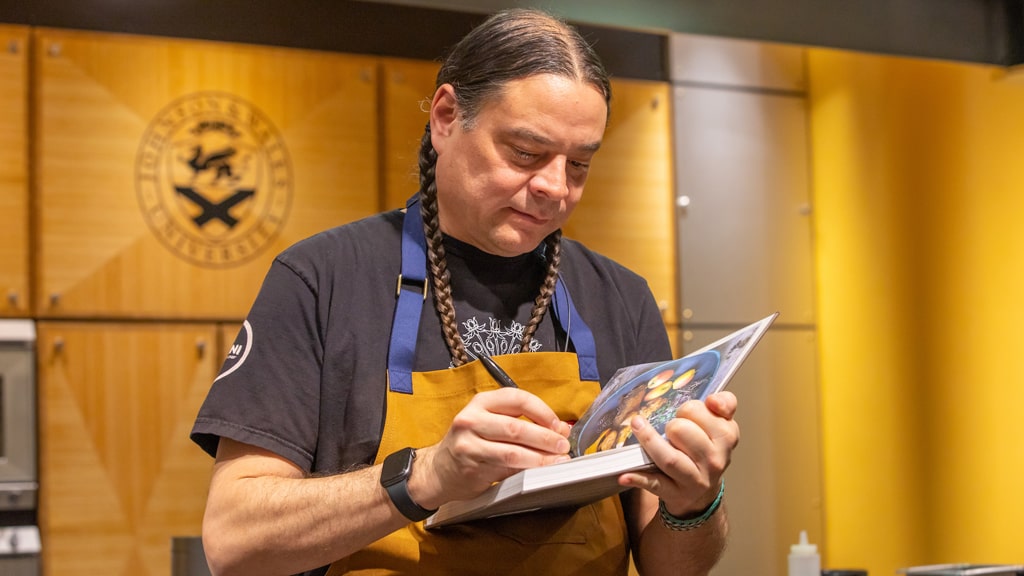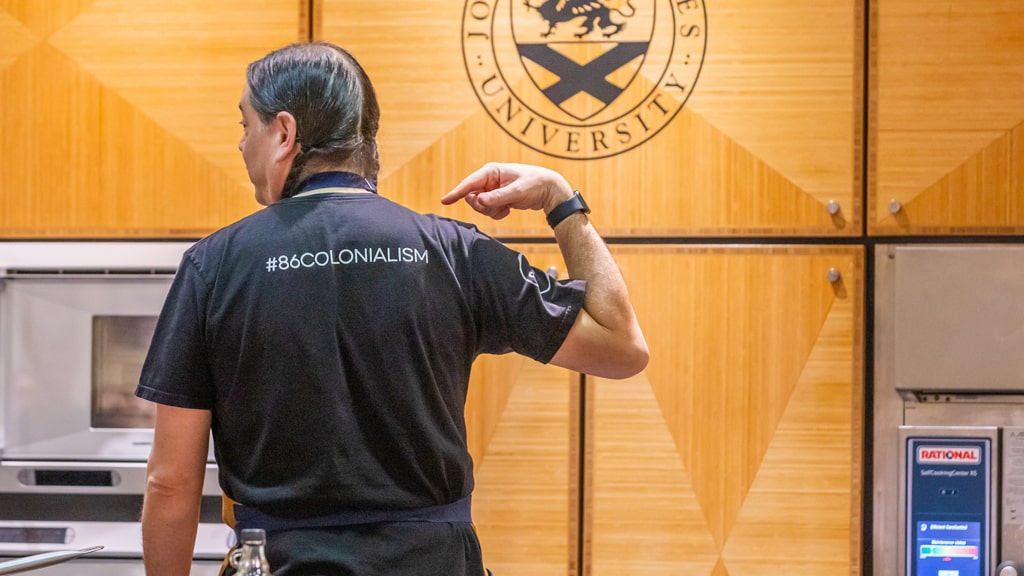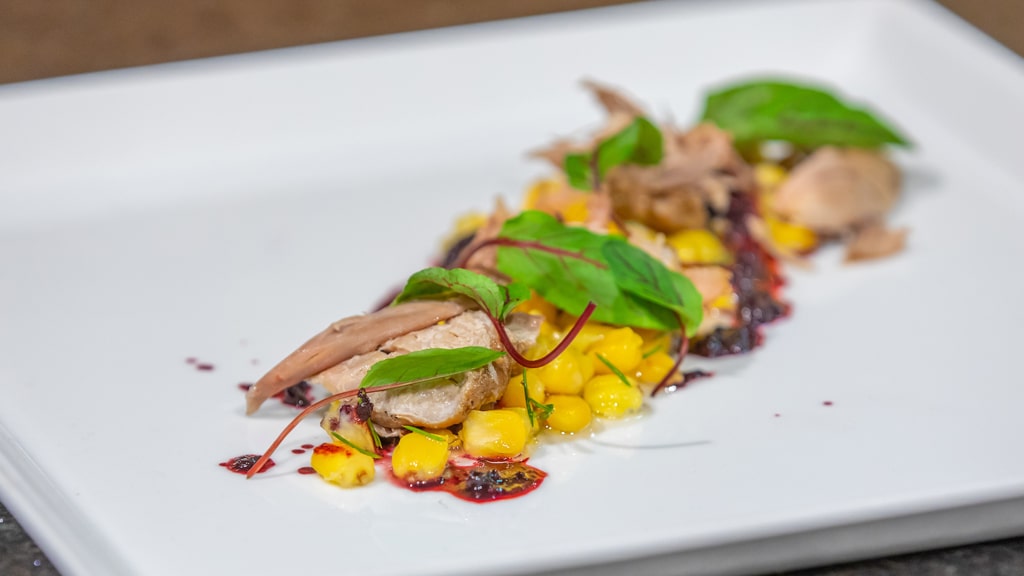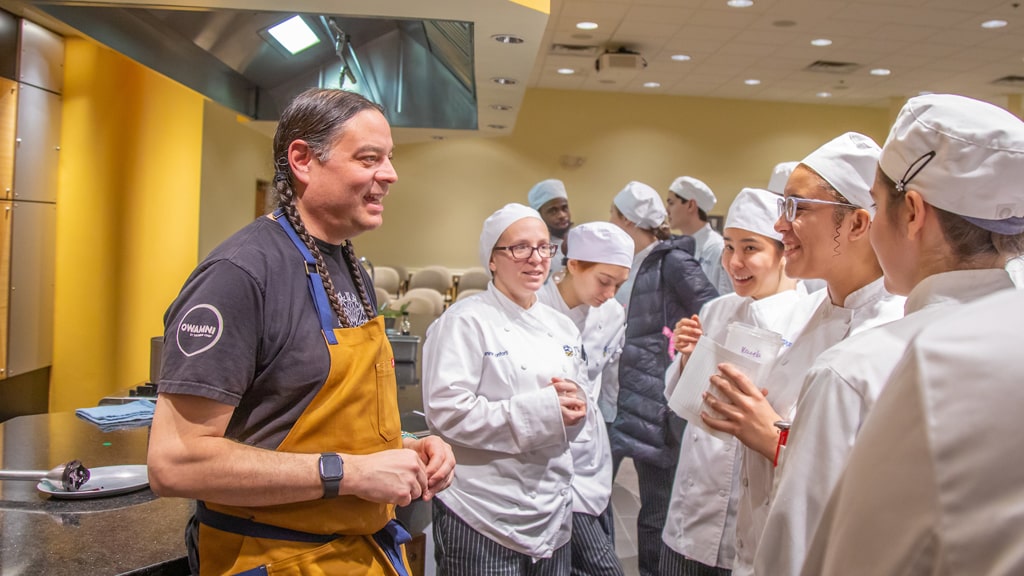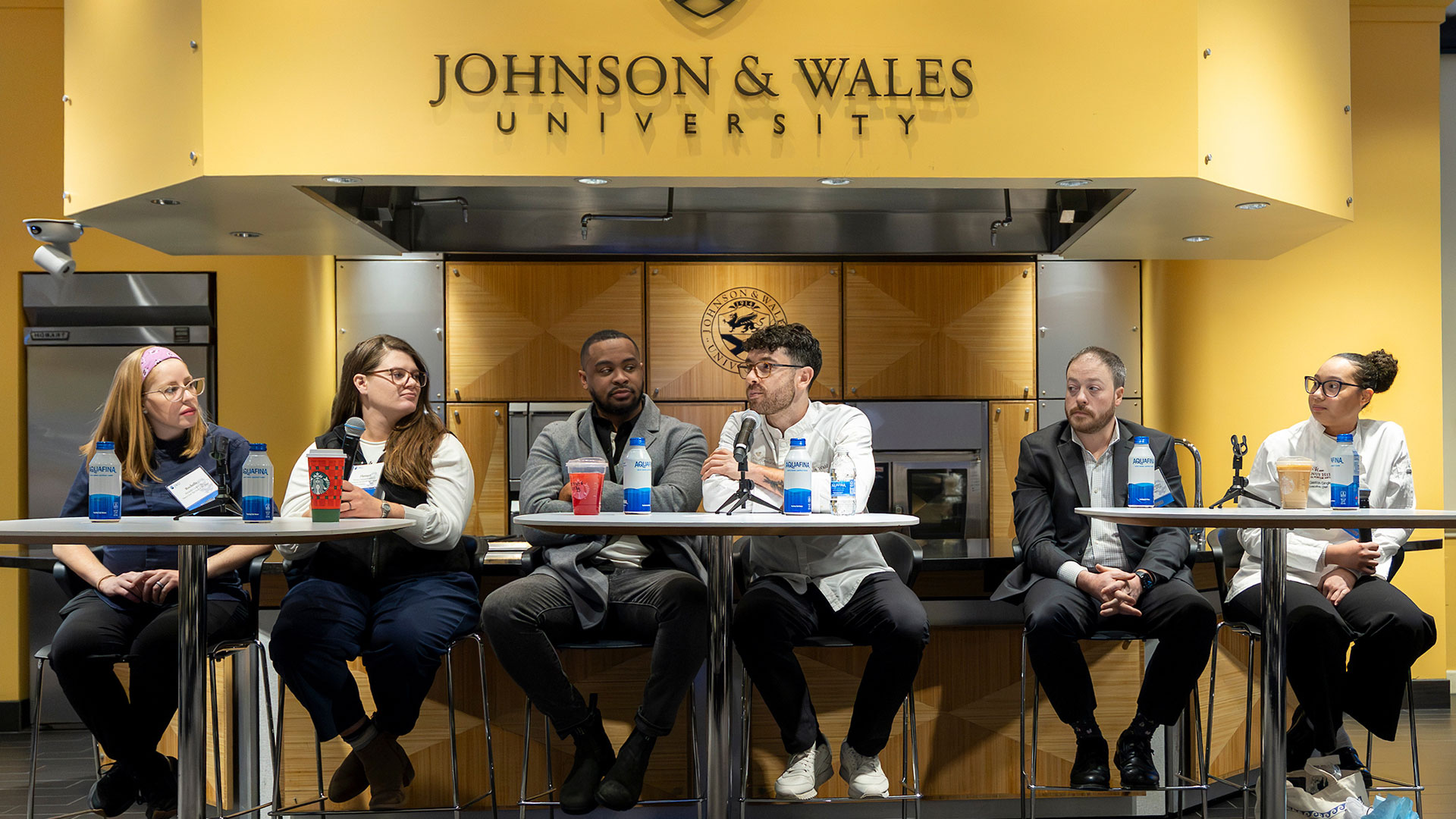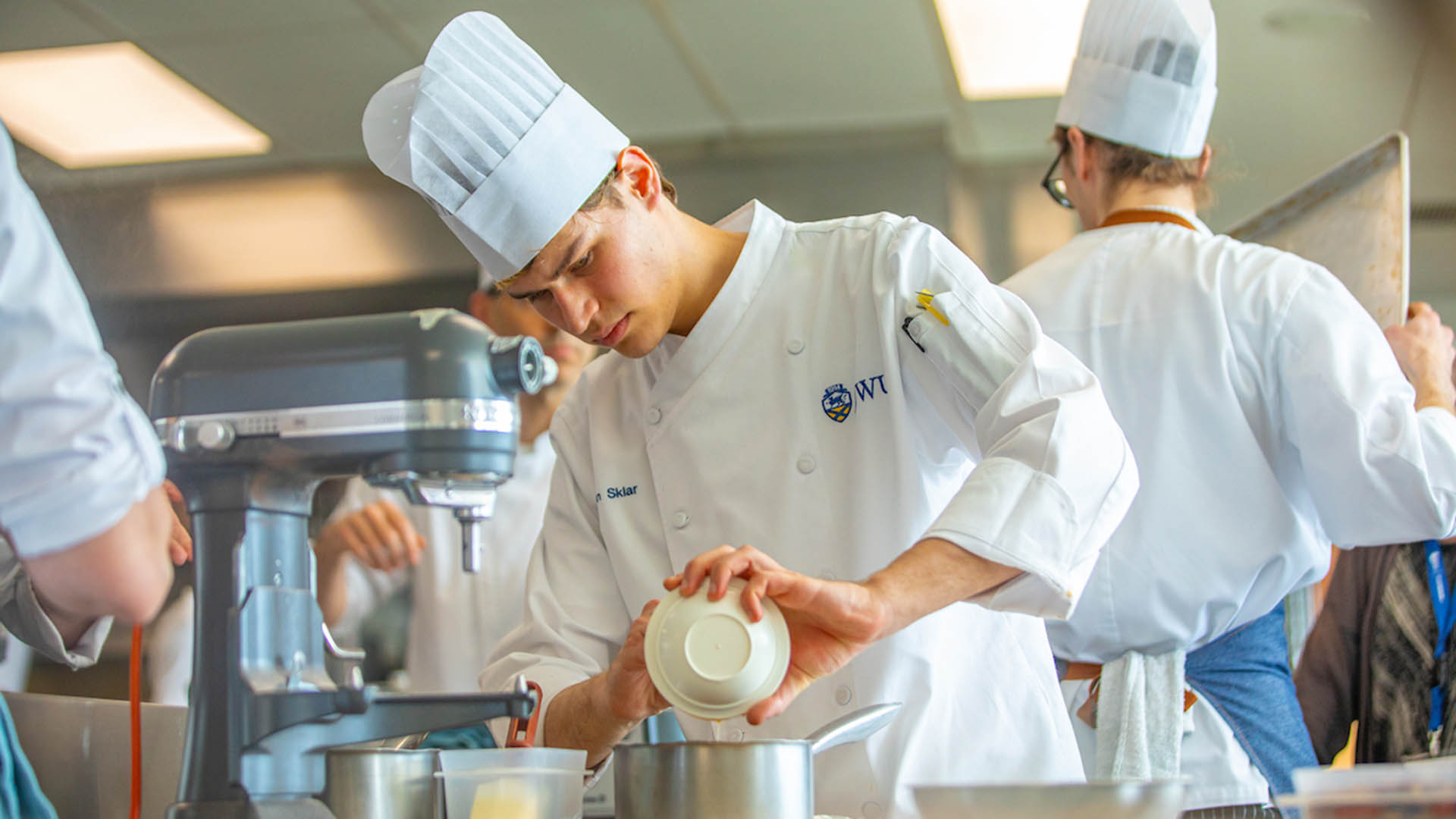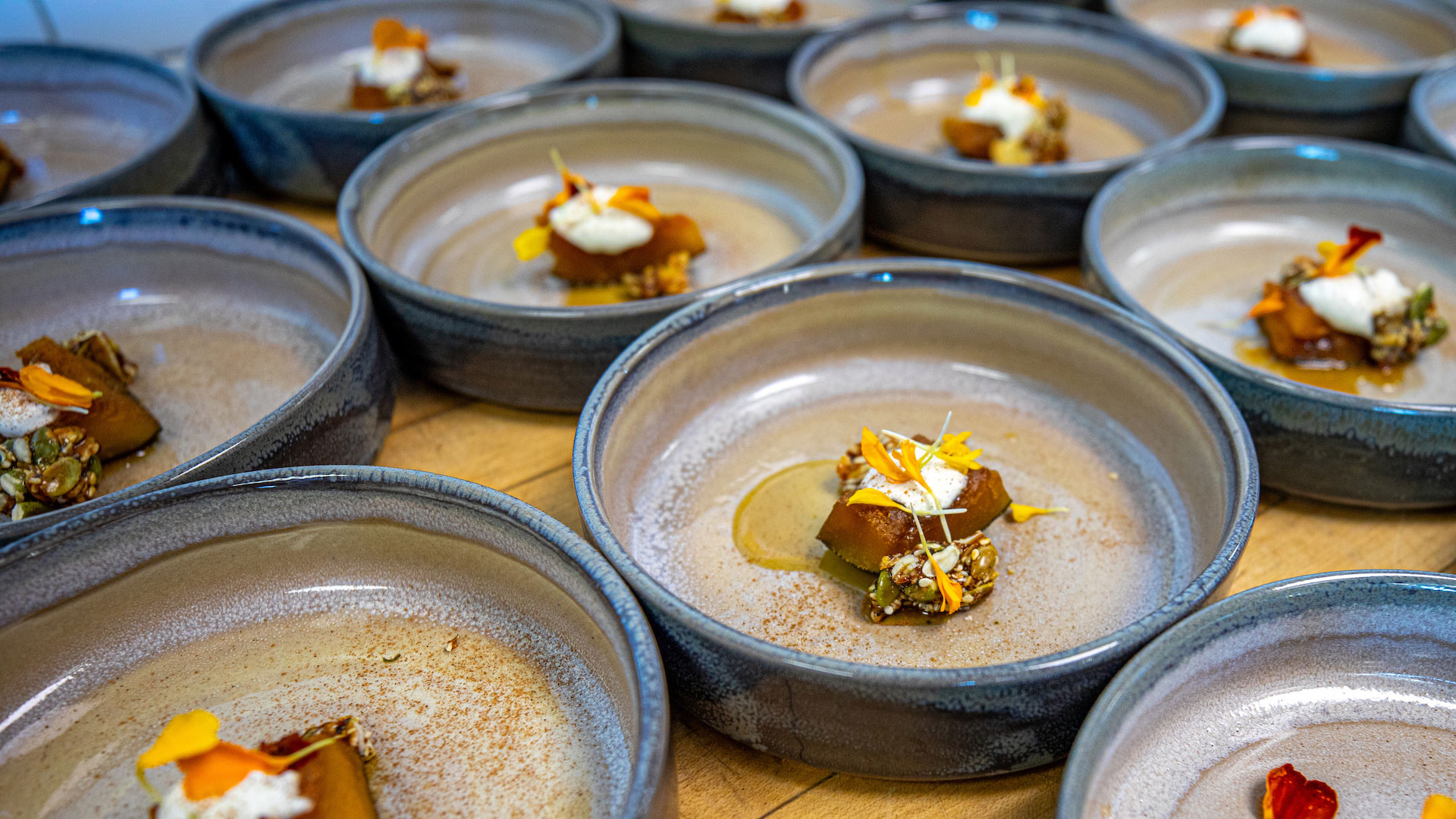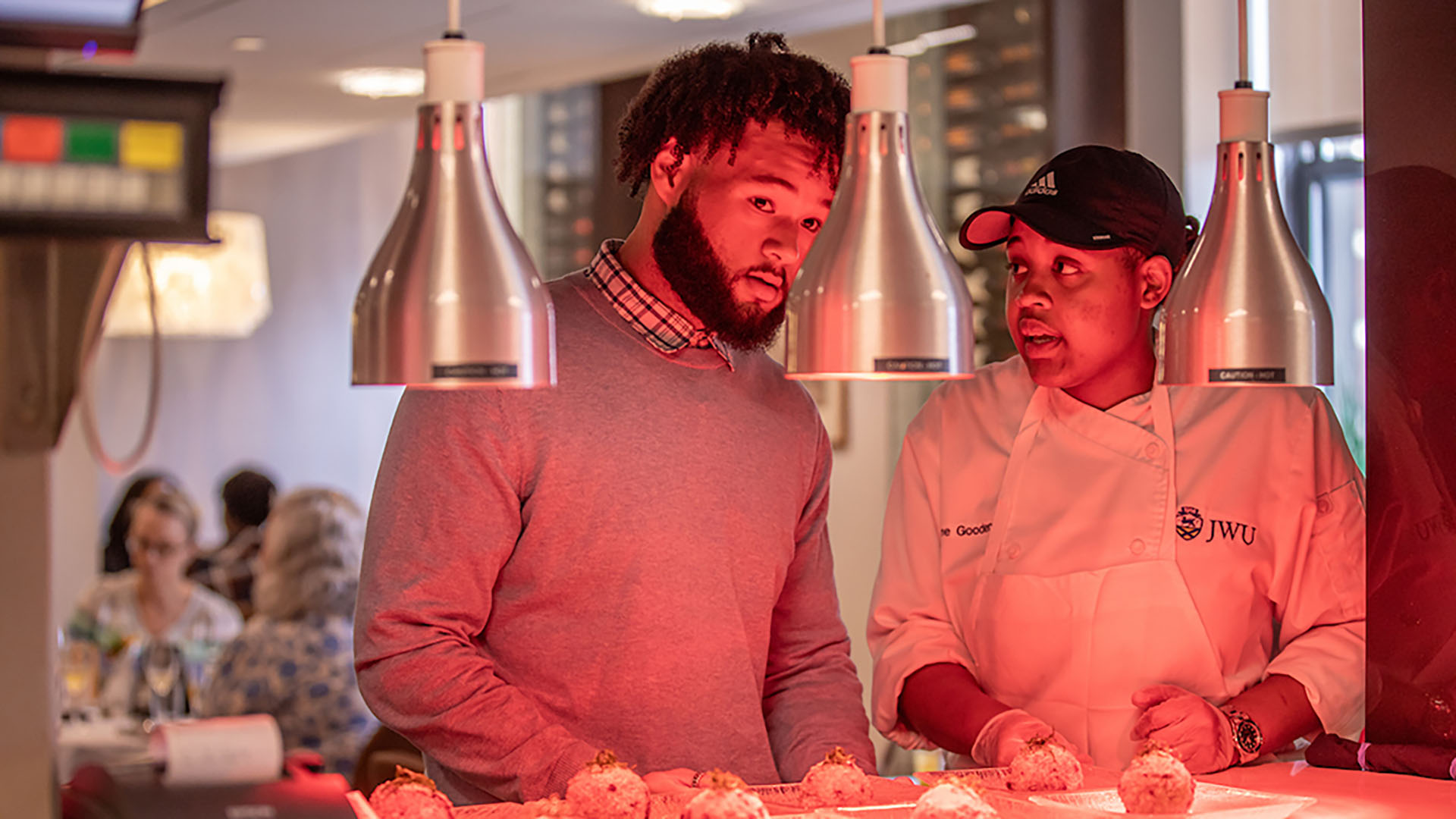Chef Sean Sherman at JWU: ‘The Future Is Indigenous’
“If you control your food, you control your destiny.” Chef Sean Sherman movingly showed during his talk as JWU’s 2023 Cultural Life speaker that the question of control is fraught regarding Native American sovereignty. With his James Beard Award-winning restaurant Owamni and his nonprofit NATIFS.org (North American Traditional Indigenous Food Systems), Sherman’s work focuses tirelessly on restoring the imbalanced food systems imposed by a long history of colonialism. As he told the standing-room-only crowd at JWU, “We can’t change the past, but we can work towards a better future.”
On a Path to Native Empowerment
Growing up on the third-largest — and one of the poorest — reservations in South Dakota, Pine Ridge, gave Sherman a personal perspective on institutionalized lack of access. The reservation had one grocery store serving a region the size of Connecticut. Unemployment was 90%. Food was a commodity product that came in boxes and cans.
“I couldn’t just order ‘The Joy of Native American Cooking’ because it didn’t exist.”
Sherman started working at the age of 13 — and he kept working. Save for a stint with the Forest Service, he mostly took kitchen jobs where he worked hard and learned quickly. By the age of 27, he had attained a chef position. By any yardstick, he’d arrived in his career as a chef. But he knew that something was missing.
It wasn’t until Sherman did a stint in Mexico that he had an epiphany that would change his trajectory. An indigenous group, the Huicholes, invited him to their sweat lodge ceremonies. He quickly became inspired by how closely they held onto their traditional ways of spirituality, dress, and culture. He recognized that he needed to closely tap into his ancestry, particularly research into indigenous foodways. As he joked at JWU, “I couldn’t just order ‘The Joy of Native American Cooking’ because it didn’t exist.”
When he returned to the States, Sherman quickly began a long process of reclaiming his own Native education; he ordered every book he could find to learn more about the authentic culture of his ancestors. He started the Sioux Chef in 2014 and began doing pop-up dinners, catering events, teaching, and lecturing, focusing on revitalizing indigenous cuisine. The press took notice, and momentum began to build.
This brings us to now. Sherman spends much of his time teaching and lecturing: “I find this platform really important. We need to understand privilege.” Sharing and discussing history — the good, the bad, and the horrific — can help us collectively imagine something better.
Reconnecting with the Natural World
“Indigenous cultures lived primarily sustainably,” Sherman explained. But with rapid colonization came the rampant destruction of ecosystems, indigenous knowledge and an entire way of life. (An 1867 broadsheet calling for bison bounties proclaimed, “Every buffalo dead is an Indian gone.”) He showed an alarming timelapse map outlining the colonial overtaking of indigenous lands, starting in 1776 with the original 13 colonies and expanding rapidly westward to California, where bounty hunting wiped out roughly 90% of indigenous people by the end of the 1870s.
“I find this platform really important. We need to understand privilege.”
Despite these bitterly sobering facts, Sherman’s message was ultimately hopeful. He emphasized the ways that all of us can reconnect with the natural world to live more locally: “Plant knowledge is power! I always tease that our kids can name more of Kim Kardashian’s ex-boyfriends than tree species. … Plants have so many properties that we need to connect with, and we should be working on making pantries that taste like where we happen to be.”
Sherman also had a message for the culinary students in the audience: “It’s important to tell a story with your food, to be intentional. What products are you using? Who are you purchasing from…? That’s how we should be thinking about food. Make it extremely regional to really celebrate that diversity again.”
A Lesson in Nixtamalization
At a morning demo for culinary students, he put that lesson into practice by making a dish free of colonized ingredients. (If you’re curious what that would entail in your home, think no dairy, wheat, or gluten; no sugar, beef, or pork; and no processed foods.)
“It’s important to tell a story with your food, to be intentional. What products are you using? Who are you purchasing from…? That’s how we should be thinking about food.”
He started by making a sauce made of chokecherries thickened with rosehips. “Chokecherries are super tannic, but they make a lovely sauce if you know how to prepare them. They grow all over North America, from this region to the West Coast and Southern Canada. I’m throwing in dehydrated rosehips. You can see them hanging on the rose bushes towards the end of the fall, and they get sweeter the longer they hang on. They have a little prickliness on them, but you can rinse them off and when you dry them out, you can crush them and can get rid of those seeds pretty quickly.” Once seeded, they have a lot of natural pectin that is activated by hot water. “Stir it up, and you have an instant jam. There’s just a ton of vitamin C in them!” He finished the bubbling jam with a pinch of salt and some pure maple syrup.
Next, he demonstrated nixtamalization, the process of turning corn alkaline by simmering it in vegetable ash. The technique originated 3,500 years ago, and it helped spread corn as a staple ingredient from Mesoamerica up into North America and Canada.
Sherman notes in his book, “The Sioux Chef’s Indigenous Kitchen,” that the process “increases the bioavailability of corn’s protein and niacin and radically reduces the toxins found in moldy corn.” (Nixtamalization boosts corn’s nutritional value and turns it a superfood.) He served the nixtamalized corn with shredded duck breast, microgreens, and the velvety chokecherry sauce.
Calling for a Return to Permaculture
Modern commercial agriculture is very good at pushing yield on foods that are nutritionally deficient. Sherman closed his afternoon talk with speculation that returning to traditional permaculture systems could help solve some of the food issues of the future.
“We can be rethinking things completely. There’s a lot of food needs out there.” He continued, “It won’t hurt to try to push to see how much food is possible to produce out of land space if we really started to manipulate it for the purpose of good, for the purpose of making more food — and we’re still going to have to have some large agricultural pieces growing out there. We could still have fields of corn because indigenous peoples living in these regions at that point of contact had advanced agriculture … and they didn’t have to use chemicals to do that. There are ancient techniques that people were utilizing forever that worked.”
“And of course, there are more people today, but again, if we really looked at the food needs of particular regions based not on privilege but on just population and how to get food out there, there are solutions. Because if we don’t try, we’ll never know.”
RELATED READING
JWU and URI Awarded $270,000 USDA Grant to Research Food Systems
Chef Chris Viaud '12 Celebrates His Haitian Roots
APPLY TO JWU TRANSFER PLAN YOUR VISIT
TOP AND BELOW: SCENES FROM CHEF SHERMAN’S VISIT WITH THE JWU COMMUNITY.
